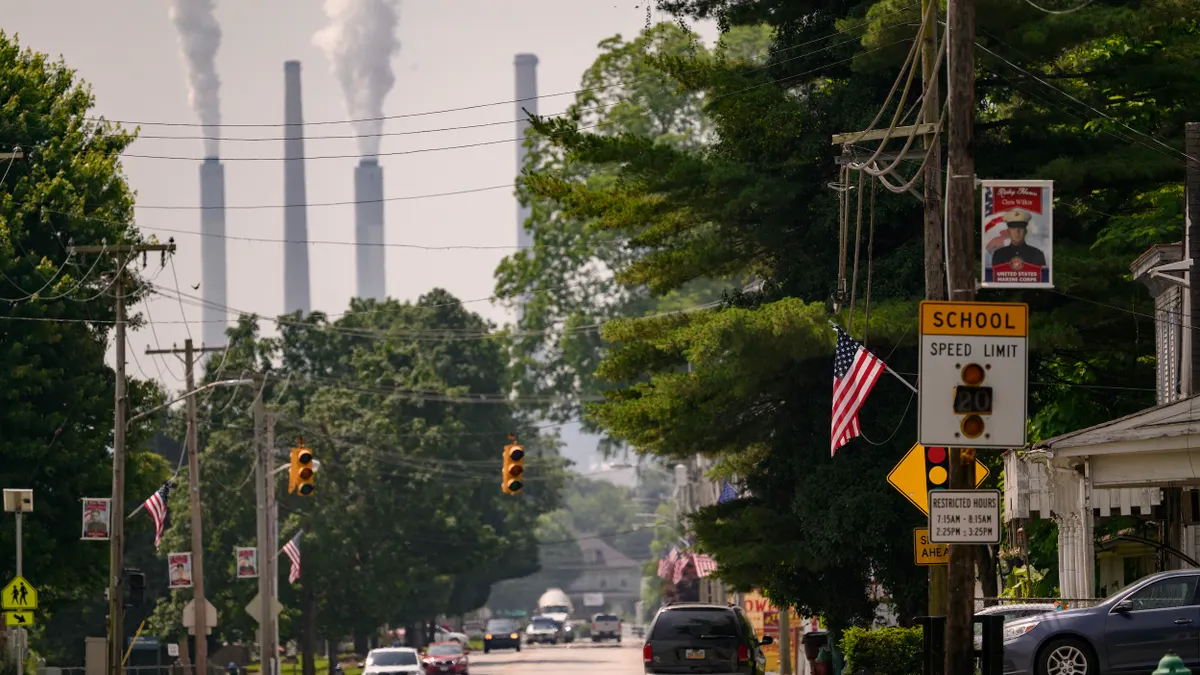Dive Brief:
-
The Environmental Protection Agency on Tuesday proposed eliminating greenhouse gas emissions standards and loosening mercury emissions requirements at power plants nationwide.
-
EPA estimates repealing emission guidelines and carbon capture requirements would save the power sector about $1.2 billion a year beginning in 2026 and repealing 2024 amendments to mercury emissions standards would save power plants about $120 million a year.
-
Climate Mayors, a bipartisan network of nearly 350 mayors, responded to the proposed changes. “These rollbacks undermine the ability of mayors to shield their residents from harm and would allow corporations to pollute our air and water, and erode the quality of life for children and families across America,” Climate Mayors Executive Director Kate Wright said in a statement.
Dive Insight:
EPA Administrator Lee Zeldin announced in March the agency was reconsidering certain power plant emissions regulations, known as Clean Power Plan 2.0, imposed by the Biden administration in May 2024.
When the rules were announced in 2024, the EPA estimated they would prevent up to 1,200 premature deaths, 360,000 asthma symptoms and 57,000 lost workdays in 2035.
The EPA’s announcement this week states it is moving forward to repeal the 2024 regulations, which it says “have imposed massive costs on coal-, oil-, and gas-fired power plants, raising the cost of living for American families, imperiling the reliability of our electric grid, and limiting American energy prosperity.”
The U.S. Chamber of Commerce said in a statement that repealing Clean Power Plan 2.0 “would remove a barrier to producing the electricity generation needed to maintain our domestic energy security and our competitive edge in critical fields like artificial intelligence.”
Some community leaders pushed back, saying the repeal would harm their constituents’ health.
“With so many affordable, zero-emission energy sources on the market, it is beyond unacceptable that the EPA would roll back pollution rules for power plants,” Ashley Stolzmann, a county commissioner in Boulder County, Colorado, said in an emailed statement. “In our area, we need to reduce power plant emissions, reverse the damage and clean our air.”
Climate Mayors said weakening safeguards around mercury “not only jeopardizes the health of city residents, especially those in historically underserved neighborhoods, it also hinders the ability of local leaders to build stronger, healthier and more resilient communities.”
The National League of Cities, in an emailed statement, urged the EPA “to consider the perspective of local leaders from America’s cities, towns and villages.”
“As first responders, local leaders across the nation have taken significant steps to mitigate impacts and strengthen their communities,” NLC stated. “Despite the progress local governments have made and their commitment to continuing action, it is clear our work is not done. We urge the federal government to be a partner in these efforts in support of the economy and building resilient communities.”
The League of Conservation Voters vowed to “fight back against these unpopular, dangerous schemes,” and the National Resources Defense Council suggested it will sue. “Our lawyers will be watching closely, and if the EPA finalizes a slapdash effort to repeal those rules, we’ll see them in court,” NRDC President and CEO Manish Bapna said in a statement.
Lawmakers responded along party lines.
U.S. Rep. Morgan Griffith, a Republican from Virginia, said it gives “communities like mine in Appalachia hope.” He said he would “continue to support federal developments that aim to reinvigorate coal communities and lower energy costs for American families.”
“It’s clear the Trump EPA cares more about protecting polluters’ profits than the communities and Americans who will bear the brunt of this dangerous decision,” U.S. Rep. Frank Pallone, a Democrat from New Jersey, said in a statement.











